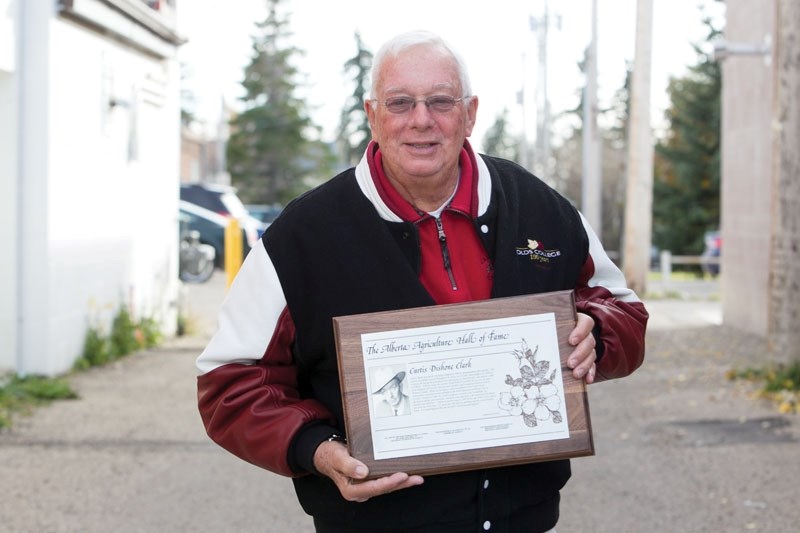Bob Clark's father Curtis got his back into his living.
He also knew just what to look for in the perfect Holstein cow: girth, a solid udder, sturdy feet and legs, and alertness were some traits Clark listed that could be found in an animal that would produce a lot of milk.
As a result, he helped transform the dairy industry in the province, serving at one time as the president of the Holstein Association of Canada.
“When they started their business, the Holstein industry in Alberta was marginal,” Clark said. “When dad finished in the 1980s, the Holstein business in Alberta was recognized as one of the strongest Holstein regions in Canada. And dad was a part of that.”
The Carstairs-based business is no longer in the family, having been dissolved in the 1990s with a dispersal sale. However, the Acme Holstein name is still recognizable, Clark said.
Along with his business partner Lloyd Pickard, Curtis's work turned their company, Acme Holstein, into the most renowned Holstein herd in Western Canada. He also won multiple awards as a breeder, dairy judge and exhibitor. An award is also named after him, presented each year at the Royal Agricultural Winter Fair in Toronto.
On Oct. 3 he was recognized with a posthumous induction to the Alberta Agriculture Hall of Fame for his contributions to the dairy industry during a career that spanned nearly five decades.
At a banquet in Edmonton, Clark accepted the honour on behalf of his father.
It's a high distinction, according to Jeanna Friedley, a public affairs officer for Alberta Agriculture and Rural Development, who said the Hall of Fame is reserved for those who've devoted their lives to working in agriculture.
“So these are people who've had lasting impact in their industries in our province over their lifetime. So it's a lifetime achievement award essentially for agriculture in Alberta and very elite group of people,” Friedley said.
Curtis, who passed away in 1997 at the age of 86, joins a very selective group — only 126 people have been inducted since the award was founded in 1951, according to Friedley.
These people, she continued, have made all sorts of contributions to agriculture.
“We're talking people who have made technological advances in their field, who have really been outside-the-box-type thinkers, who have brought new processes, new procedures, new ways of doing things,” she said.
Clark, who is currently the chair of Olds College Board of Governors, said his father's induction to the Hall of Fame was a humbling experience for his family and thanked agriculture organizations, local residents and family members who supported Curtis's nomination.
“My greatest regret is that it didn't happen when he was still alive. But having said that, it's a great honour,” he said. “For our father to be in there is a great tribute to him, not only as a cattleman, but I think also as a person.”
Clark described his father as a man who loved people and was involved with the local chamber of commerce, a church committee and served as a volunteer 4-H leader.
To Curtis, the virtue he showed to others and the community made good business sense.
“If you're buying cattle from someone, you want to be buying cattle from someone who's honest, won't you? And not going to be spreading you a lie,” Clark said. “And the fact that they were involved in the business for close to 40 years speaks volumes of his integrity and his word. Dad's handshake was worth a lot.”
Clark remembers toiling alongside his father morning and night while growing up on the farm in Carstairs. He took away four key lessons that he's lived by ever since.
“One was the value of hard work. Secondly, tell the truth. It's hard to cover things up. No. 3, you can get a lot of things done if you don't care who gets the credit for it, and fourthly, the importance of being involved in the community,” Clark said, adding that he also learned to value family during that time.
“When it's all said and done, you have your family and your friends. So those four lessons were really important to me.”



